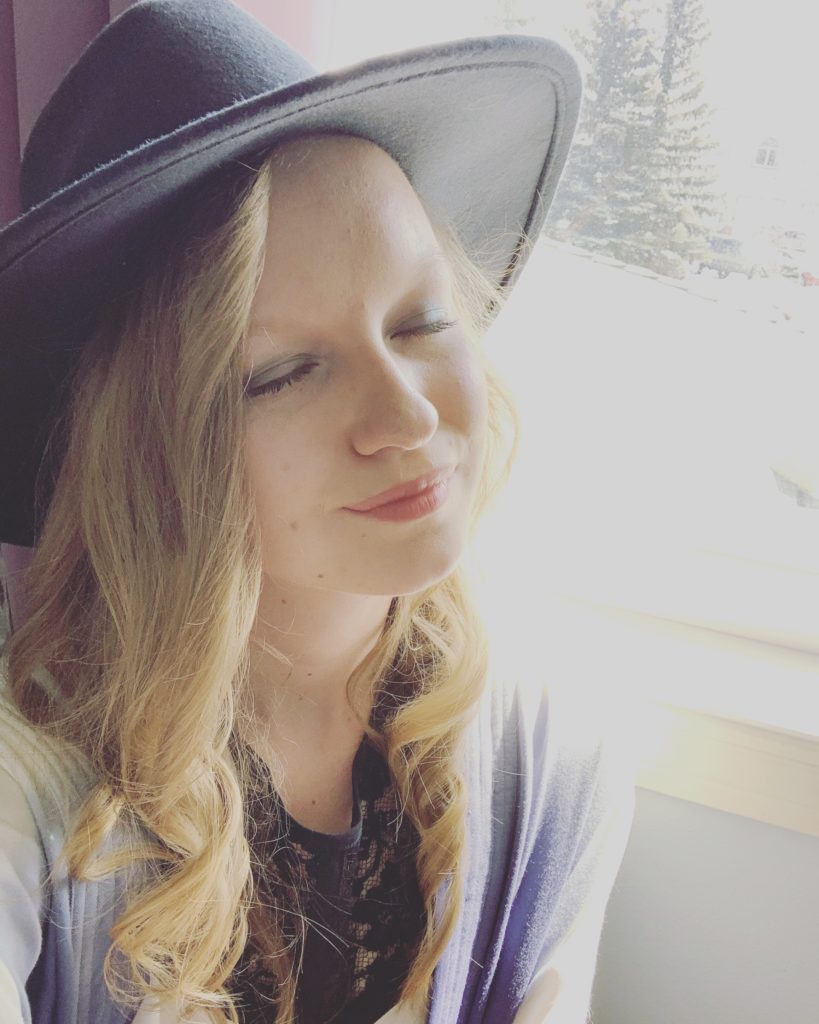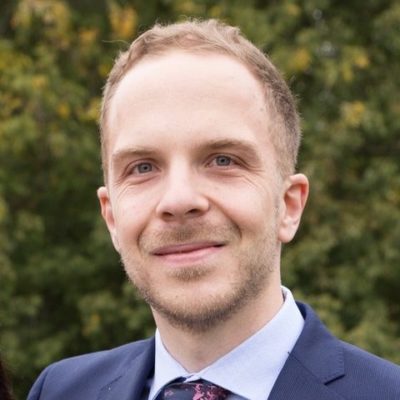“Mistakes” in the Sound Archive: An Interview with Leah Van Dyk
September 4, 2020
Mathieu Aubin


In May, I reached out to Leah Van Dyk shortly after she was awarded a Killam scholarship for her research in environmental humanities. Having met Leah before and heard her present at the “Text/Sound/Performance” conference in Dublin, Ireland in April 2019, I was excited to catch up with her and hear about her ongoing research. As I quickly found out, while her research focuses on environmental humanities, pedagogy, and accessibility, Leah is also often thinking about serendipitous moments activated through sound.
Congratulations on your new Killam Scholarship! I’m very excited for you. I wanted to start our interview by asking, what excites you in your research right now?
Thanks so much, Mathieu! It’s been a very exciting time. There are so many different things happening across SpokenWeb that it can sometimes be overwhelming, in the best way possible! I am currently preparing our audio archives for public dissemination and am super excited about being able to share and explore the University of Calgary’s archival audio recordings together. Our team at Calgary is small (but mighty!), which means that every audio recording is listened to and has data produced by me, and I can’t wait to have the opportunity to see the public begin to engage with the recordings I have come to know so well.
It’s incredible that you have this opportunity to be so close to the audio recordings. What are some of the more interesting things you’ve heard in these recordings?
It is really amazing to work so closely with each author’s recordings, and the most exciting part of working with these recordings has been the unexpected encounters between myself and the poet. Many of the authors, such as Earle Birney and Robert Kroetsch, were also university instructors and spent a great deal of time on their recordings “teaching” their imagined listener. It’s fascinating to be listening along with Birney reading and all of a sudden he’s speaking to you–saying “listen closely English literature students.”
Thinking about your engagement with the archives, can you give a bit of a teaser for your planned paper for the conference?
A bit of a teaser? Hmm… In my personal research I am engaged with work around community and community-building through literature, and my planned paper integrates these concerns into the world of recorded audio archives: asking how we pedagogically and ethically approach archival dissemination and engagement. Spoiler alert: I REALLY believe in public-facing pedagogy and an open and accessible practice of community engagement.
That’s great! I think that, when we design these digital objects and tools, we need to think about the user. What do you think needs to be integrated into an audio archive for it to be open and accessible to the larger public?
I completely agree, without attending to the public user we risk creating an echo chamber of digital engagement that only functions for those already fluent in the field. Ideally, an audio archive has a number of things that create an open and accessible space, which begins with a free and user-friendly platform. I think the SpokenWeb Montreal SGW Reading Series does an excellent job of providing a model for transcribing, time-stamping, and searching audio files–all of which are incredibly essential to public access. Having recently made the transition, as many of us did, to teaching online, I have also become even more acutely aware of how file type is an accessibility issue, and would encourage any audio platform to consider offering a lower-quality audio file (.mp3 for example) in addition to our traditional .wav file. For many of my students, this was the only way to engage with materials, as a smaller file accommodates listening on mobile devices or through an unreliable internet connection.
What are you listening to these days?
Podcasts! I am a podcast fiend and when I’m not listening to the recordings of writers such as
Robert Kroetsch and Earle Birney, I am definitely tuning in to my favourite podcast series’
(Mothers of Invention, Drilled, Ephemeral, and all things murder mystery) – I also love listening to the SpokenWeb podcast, as it’s another way to stay connected and learn amazing things about our researchers, collections, and history.
These podcasts seem to vary in range from climate change activism (Mothers of Invention and Drilled), to archived materials (Ephemeral), and to, as you say, “all things murder mystery.” What pulled you to these different podcasts?
That’s a great question! I started listening to podcasts in earnest when I began graduate school as a way of keeping up with popular research in my field. While I spend a lot of time digging through the archives, I have to confess that archival studies is not actually my field of research. As you note with the first two podcast choices, my research is on climate change activism and environmental policy! What I do think connects not only these disparate podcast choices but also my work in archival studies and the environmental humanities is the centrality of community to these conversations. I am interested not only in how community is built and maintained but also in how to build community through scholarship, whether that is the community found in activist work, through the intentions behind audio recordings, or even the breakdown of communities dramatized in murder mysteries.
What has surprised you the most about the audio collections that you’ve been working with at UCalgary?
It’s difficult to choose a specific moment or process of working with audio collections which holds the most surprises! But, for me, the most surprising—and often entertaining—moments within my work come from what we might call the “mistakes” within a collection: botched recordings, blank tapes, seemingly unrelated notes and labels. Especially for authors who recorded their own tapes, the ephemeral inclusion of background noises, interruptions, or messy beginnings and endings of the recording continue to surprise and delight me! For example, there was an audio recording I was recently listening to by Alden Nowlan where midway through the tape his voice cuts out and is replaced by a few moments of silence, only to be turned back on in the midst of a child’s birthday party–young voices are experimenting with the recording equipment, saying hello and talking away with no Nowlan in sight! The first time I listened to this recording, it was like being shocked out of dormancy. I was sitting and passively taking in the recording, jotting down some initial notes, and all of a sudden there’s joyful young voices who’ve come to say hello! When we talked about this, Mathieu, you called it a recording of found sounds, and I think you are so right to call it that! This apparent error or oversight in his recording really made me sit back and question why Nowlan would choose to include this in his archive. His other tapes are generally well-organized and contain intentional edits, and his voice lends a very specific, almost subdued, soundscape to his recordings. I think, perhaps, that Nowlan himself received as much joy from the unexpected interruption of his recording as we do. And I’m certainly glad he decided to pass it along to us.
Me too! Unfortunately, we do not have permission to share this recording with our readers, but what does it mean that we can’t listen to it? Have we lost anything or is it still possible to create a narrative about this recording?
This is a great question, and one I think many archivists and archival researchers struggle with. The material is always available, but not necessarily in the format we would like for research in 2020. Nowlan, for example, passed away in 1983, and his archival agreement—which tells us as archivists and researchers what we can do with his materials—reflects that time, and with no means of knowing the future it’s not a surprise that this agreement doesn’t make provisions for wide-spread dissemination on the internet (which was in its relative infancy at the time of his death). However, that doesn’t mean this recording has been relegated to the corners of our archive: one of the priorities at UCalgary moving forward in this project is to establish a standard practice for the public sharing of digitized recordings, something which I am very excited about! For now, the narratives around this recording must necessarily include this loss—but are richer discussions for it. To grapple with the difficulties of audio preservation and dissemination, even through one singular recording, is to continue to push and challenge a field which is filled with innovation and creativity, and which I believe will lead to a solution that is ethically conscious of the simultaneous history and possibility of these archives.
Thank you Leah, it’s been great chatting with you!
Leah Van Dyk (she/her) is a doctoral student and Killam Laureate in the Department of English at the University of Calgary. She gratefully researches and studies as a settler on the traditional territory of Treaty 7, with her primary research interests located around the environmental humanities and radical revisionings of being in community—both pedagogically and practically—as a model of literary practice. She recently published an article in English Studies in Canada, is passionate about community projects, and is overly fond of coffee. Follow her on Instagram and Twitter @leahvandyk.
This article is published as part of the Listening, Sound, Agency Forum which presents profiles, interviews, and other materials featuring the research and interests of future participants in the 2021 SpokenWeb symposium. This series of articles provides a space for dialogical and multimedia exchange on topics from the fields of literature and sound studies, and serves as a prelude to the live conference.
